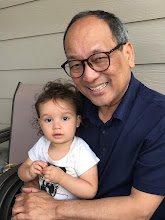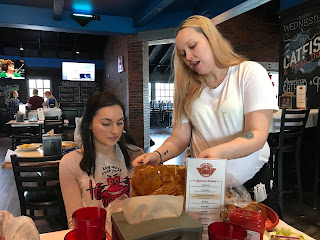I found a dream, a dream that I can speak to and perhaps taking my role as an educator, I can speak of in relaying my experience and conveying what I learned through it all. A dream to live my life the way I envision it to be - to take charge of it, so to speak - to live God's given opportunity of living authentically and to be true to myself as much as possible. The dreamer in me has to find an avenue to do so. I need space to explore and am willing to take the risks. Existentially to live an authentic life, what and how must I chart the course of my life travels? Do I recognize the barriers in front of me in order to get to where I want to and to expand my horizon? If we believe that we are a creature created by an awesome power, then we must also believe that we are good to be anywhere in and within his or her creation.
It began, I think, very innocently enough. I was in grade 1 and when I returned home from school and threw my heavy bag on my bed and dashing out of my room on to the living room, I found my dad was sitting on the couch and he was in tears, quietly and by himself. I went to him, pressed my small frame onto his lap and hugged to comfort him. He returned my hug and I asked him for the reasons of his tears. He in a matter of fact, responded that President Kennedy was shot dead. I quickly resorted to my childhood curiosity and asked him who he was and how was he related to us. Dad explained that John Kennedy was President of a country on the other side of the earth, a country which is blessed with natural abundance and generous respect for liberty, happiness and freedom. The description sounded more like the end of a rainbow! There I was, looking up to the sky and visualizing my own rainbow in my psychic and was on a perpetual journey of discovery, learning about myself seeking the nirwana at the end of it.
My first encounter with an American was a peace corp who taught my older cousin at her agricultural and vocational school. During a school vacation he travelled sightseeing the country and stopped by the house. He spent the night. Dad presented him with a kris, a Malay dagger. Mom cooked a meal and I was a merely a 10 years old translater with whatever English I know as a 4th grader in primary school. He also must have learnt Malay at a very basic level to carry on the conversations. When I was in middle school, we had Mr. Thomas Posin from Iowa, who was also a peace corp assigned to my school and he was also my scoutmaster. Later when I was in secondary school, we had a series of British teachers. Americans seem to carry with them an air of self-assuredness, warmed with personal liberty without being feudal, formal and strict with class or caste boundaries. This quality is perhaps what attracted me to them for they are free of superficial arrogance of being better civilized, etc,. etc.
My first encounter with an American was a peace corp who taught my older cousin at her agricultural and vocational school. During a school vacation he travelled sightseeing the country and stopped by the house. He spent the night. Dad presented him with a kris, a Malay dagger. Mom cooked a meal and I was a merely a 10 years old translater with whatever English I know as a 4th grader in primary school. He also must have learnt Malay at a very basic level to carry on the conversations. When I was in middle school, we had Mr. Thomas Posin from Iowa, who was also a peace corp assigned to my school and he was also my scoutmaster. Later when I was in secondary school, we had a series of British teachers. Americans seem to carry with them an air of self-assuredness, warmed with personal liberty without being feudal, formal and strict with class or caste boundaries. This quality is perhaps what attracted me to them for they are free of superficial arrogance of being better civilized, etc,. etc.
My childhood was during the time when Malaya just achieved its independence from Britain but the country was still fighting communist insurgents. I remember visiting my maternal grandparents and family in Manik Urai in early 1960s, a place where both my brother and I were born. The house was made of hard wood and bamboo floor and the siding was made from tree barks. Every time I visited them, I could smell durians and bananas on those bamboo floor. It took me a while to figure out how to walk on those bamboo floor so as not to slip my foot between the bamboo pieces. Many years or perhaps decades later when I was visiting the Philippines on business, I had a chance to visit a private university campus and where there was a house of the old Filipinos built and maintained as a muzium piece. It reminded me much of the maternal grandparents' house in Manik Urai. During those early days of merdeka or independence, Manik Urai was created as a new village, a containment policy adopted by the British military to group local population into one area to filter out communist from the native villagers. I remember the term, "Comitihall" a house built to assemble the villagers as a committee hall where villagers could gather. It was located next to grandparents' house. The area also had running water for public consumptions. In the early evening, hordes of villagers would bring their containers to fill with waters and we, kids, would be playing with and around the tap much to the annoyance of those adults. I recall there was a big tree in front of the house and there were a lot of banana trees at the back of the house.
Several years later after Malaya was to become Malaysia, Indonesian Sukarno declared a "konfrontasi" assault. I remember in school, we were made to practice covering our heads in case of bombing attacks. I clearly recall such practice on a plain soccer field, but did not recall practicing it in the classrooms. There was no running water like it is today but we have to dig a well within the house, usually near where the kitchen was located. The odd house was always a few yards away from the main house, passing the chicken hut along the way. We learned how to lower the bucket usually made of tin bucket or palm leaves bucket into the well and scooped the water up. Think of taking a cold morning shower for school every morning! Mom made us do our own laundry during weekends, starched and placed them on clothes line to dry in a hot tropical sun. Later that afternoon, we had to burn wood charcoals and placed them on copper iron to iron the dried clothes. I was so efficient and good at it that Mom used to ask that I iron dad's work clothes. I tried to ask for allowance for those chores to no avail. Dad was good at increasing the number chores such as polishing his work shoes every weekends. The rewards would be often in kind such as we went to the field and fly the kite that he made from bamboo. Kids in the neighborhood congregates to him for similar kites.
I was the responsible one among my cousins especially being the oldest from my paternal side. My mom used to tell me stories that her father-in-law who is my paternal grandpa uttered during a birthing ceremony. Mom was in labor for several days and relatives and friends gathered in my maternal grandparents' house in Manik Urai. During those days, it took days for my paternal grandparents to travel from Perupok to Manik Urai but there they were. The midwife placed a coconut in her hand, position her hand slightly above the top of my pregnant mother and cracked it open. When it did, one half of the coconut flew off and hit my mom's head. Upon witnessing this, my paternal grandpa shared his premonition that a child who was still in the womb and yet to be born would one day travel further than any of his ancestors. My paternal grandpa who hailed from Marang, Trengganu worked as a sailor travelling on a sail ship plying the coast to and from Marang to Pattani, Thailand where they bought salts and brought it back to Trengganu to sell. I was fortunate enough to witness similar sail ships in the waters off Perupok coast during my childhood days. I was captivated by the mere sights of such sailing ships. Dad who hailed from Perupok on the coast took an administrative job in the hinterland of Manik Urai. That was during the times when people are relocating by purchasing plots of jungle land to clear and make a living and he facilitated those applications and met my mom and her family and they got married.
I was twelve when I finished my elementary education at Pak Badol. I was a leader too. English was first taught when I was in forth grade.
Even in the late 1990s and 2000s whenever my mom and I talked about how I was living the United States, she or I occasionally mentioned the story about the coconut and it did seem to sooth her for she resigned to the fact that I was a traveller.
[work-in-progress]
































.jpg)



